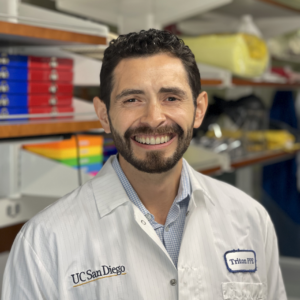 |
Dr. Brian Aguado is currently an Assistant Professor of Bioengineering at UC San Diego, where his laboratory research is focused on studying sex differences in cardiovascular disease using biomaterial technologies. Dr. Aguado completed his BS degree in Biomechanical Engineering from Stanford University and his MS and PhD in Biomedical Engineering from Northwestern University. He also obtained his certificate in Management for Scientists and Engineers from the Kellogg School of Management at Northwestern. He completed his postdoctoral fellowship in Chemical and Biological Engineering at the University of Colorado Boulder.
Dr. Aguado has received numerous awards to support his research, including the Burroughs Wellcome Fund Postdoctoral Enrichment Program award, the NIH K99/R00 Pathway to Independence Award, the American Heart Association Career Development Award, and the Chan Zuckerberg Initiative Science Diversity Leadership Award. Dr. Aguado currently serves on the Editorial Advisory Boards for the Journal of Biomedical Materials Research Part A and GEN Biotechnology. Dr. Aguado is also a dedicated science communicator outside of the lab and seeks to engage historically excluded and marginalized populations in the sciences. Dr. Aguado co-founded LatinXinBME (Twitter: @LatinXinBME), a new social media initiative dedicated to building a diverse and inclusive community of Latinx biomedical engineers and scientists to support each other personally and professionally through their careers. For his efforts, he was named one of the 100 Most Inspiring Latinx Scientists in America by Cell Press and received the Biomaterials Diversity Award for Young Investigator from the Biomaterials journal. Find out more about Brian’s research on his webpage Follow Brian on Twitter @BrianAguado and check out @LatinXinBME |
Read Brian’s Emerging Investigator article, ‘Inflammatory serum factors from aortic valve stenosis patients modulate sex differences in valvular myofibroblast activation and osteoblast-like differentiation‘, DOI: 10.1039/D2BM00844K
Check out our interview below:
1. How do you feel about Biomaterials Science as a place to publish research on this topic?
Ever since graduate school, I have always acknowledged Biomaterials Science as the preeminent journal for our field. For a couple years during my PhD, I blogged for the Royal Society of Chemistry and contributed short “pop science” articles about Hot Papers published in Biomaterials Science. Now as a PI, it feels rather special to have contributed my lab’s first research article in a journal I have respected my entire career.
2. What aspect of your work are you most excited about at the moment and what do you find most challenging about your research?
I am proud that my lab’s research program at the intersection of sex-specific cardiovascular biology and biomaterials engineering resonates with historically marginalized students in STEM fields. I believe that through addressing health disparities (specifically sex-based disparities) in the lab, I can simultaneously attract folks from marginalized communities to the bioengineering community, all while conducting research that impacts their respective communities.
3. In your opinion, what are the most important questions to be asked/answered in this field of research?
Our lab is interested in understanding the independent and synergistic contributions sex hormones, sex chromosomes, and inflammation in regulating sex differences in cardiovascular disease. In order to resolve sex and gender disparities, our lab believes biomaterials can be leveraged to determine sex-specific mechanisms of disease and more accurate sex-specific treatments.
4. Can you share one piece of career-related advice or wisdom with other early career scientists?
Prioritize your trainees over your science always. Your students’ career success hinges on their personal happiness and well being. Focus your efforts on bringing your full authentic self to the work place, which will help develop strong rapport and trust with your lab members and create a more inclusive lab environment.










